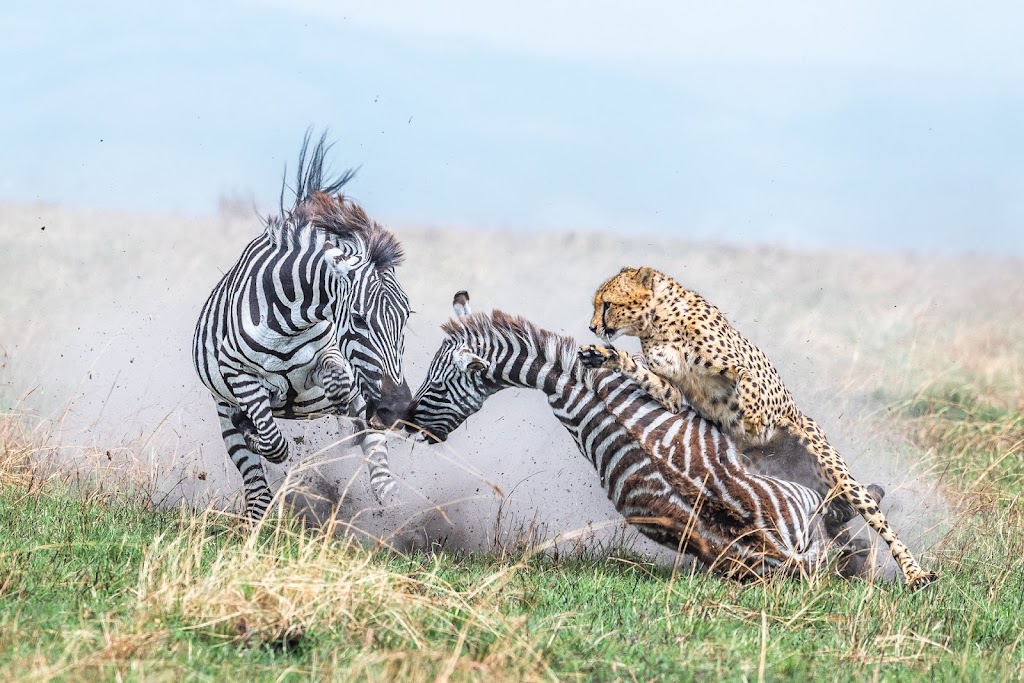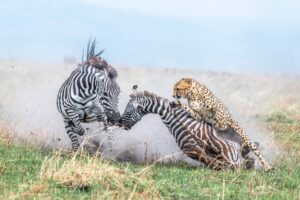Image credits: Alex Brackx, The World Nature Photography Awards, 2024
I was scrolling through the World Nature Photography Awards when I stumbled upon this striking image. It stopped me in my tracks- a cheetah clinging to a zebra, claws gripping its paws with unrelenting force, as another zebra moves forward in defiance. The sheer intensity of this moment frozen in time felt almost otherworldly. Yet, it wasn’t the violence that struck me, it was the raw, unfiltered truth it conveyed: life, in all its beauty and brutality is an incessant struggle.
This image draws us into the confrontation with the essence of existence. The cheetah’s leap is not an act of hostility; but an act of survival, a reflection of the unchangeable laws of nature. The zebras’ resistance is equally instinctual, a natural move to hold on to fragile life. Together, they enact a timeless dance, one that transcends the species, ecosystems or the photo, reaching to the core of what it means to exist. In this moment, we glimpse at a paradox that bears all of life: Creation and destruction aren’t opposites, but partners in the eternal cycle of life.
What struck me most about this photo is its quiet indifference. Nature does not assign blame or virtue, it simply is. The cheetah’s hunger isn’t cruel or unjust, nor is the zebra’s plight tragic in the human sense. Yet, as human beings, we cannot help but impose meaning onto this scene. We root for the zebras, empathizing with their fear, or marvel at the cheetah’s grace, admiring its efficiency. This tendency to project our moral frameworks on nature shows more about us than the natural world. It speaks to our need for narrative, order in chaos- a need to find purpose in a universe that offers none.
The image powerfully contrasts attack and resistance, both driven by the inherent will to survive. The cheetah’s lunge and the zebras’ struggle highlight the relentless drive to endure, even when the odds seem impossible. There is a strange irony in this fight—a battle against an inevitable outcome. Yet, something deeply meaningful emerges in the very act of refusing to give up, even in the face of certainty. The struggle itself becomes a testament to the persistence of life.
The interconnectedness of it all also has a haunting beauty. The cheetah cannot live without food, and the zebra cannot thrive without the balance predators bring to its ecosystem. This interdependence reflects our own existence. We, too, are a part of the greater whole, bound by forces we fail to understand. Our lives, like those of the creatures, are wound into complex webs of relationships, struggles, and compromises that define the human experience.
The image reflects both the grandeur of nature’s intricate balance and the unsettling fragility of life. It reminds us of universal truths: that life is fleeting, struggle is a part of existence, and meaning is something we must create in the face of it all.
This single frame—a chaotic burst of dust, tension, and instinct—captures the raw intensity of those last moments. It portrays the cheetah’s determination and the zebras’ desperate fight, a dance of survival in which every action is driven by instinct. Though harsh, the struggle reflects the essence of life itself. In their resistance, fleeting connection, and fight for survival, these animals embody the unyielding spirit of existence.
What parallels do you see between the struggles in nature and the challenges we face as humans?
Let me know in the comments!
Written by: Kapish


Superb job Kapish
This is so well thought and well written kudos to you
Thanks a lot!
Thanks a lot!
Your prose breathes life into the moment—evocative, profound, and masterfully crafted.
Thank you!
Life is fleeting, struggle is a part of existence, and meaning is something we must create in the face of it all.
Very well written, loved reading this! Keep up the good work!!!
Beautiful perspective, thanks a lot!
This is really mind blowing dude!!! Keep up the brilliant work bro!!!!
Reading your take on how humans mirror nature was a fresh and much awaited experience. Loved the way you have framed your perspective. I agree with the fact that life requires struggle and we rely on strange dynamics to sustain ecosystems. Despite surviving centuries of struggle and hardship, we somehow find ourselves replicating other species and their behaviours. Monkey see, monkey do.
What are some instances in life where you drew parallels between human nature and animal behaviour? And do you think that even today survival is only rewarded to the fittest?
Thanks!
Thank you for your thoughtful take! Human behavior often mirrors nature’s dynamics in fascinating ways. For instance, hierarchies in workplaces resemble animal packs like wolves or lions, where leaders maintain order and allocate resources. Similarly, humans display courtship behaviors akin to peacocks or bowerbirds, using fashion, conversation, or status to attract attention.
Territorial instincts are another parallel—animals defend their spaces, and we guard our homes, land, or ideas with the same vigor. Even our collaborative efforts reflect ecosystems where survival depends on mutual dependence.
As for survival of the fittest, it remains relevant but has evolved. Today, “fitness” often means adaptability—quickly learning, evolving, and thriving amidst change. Strength has shifted from the physical to mental resilience and innovation. Nature reminds us that survival isn’t about dominance but balance, cooperation, and the ability to adapt—a reflection of life’s unending struggle.
Amazing! Extremely well written and thought provoking!!
Thanks a lot!
We'll written Kapish. Great work.
Thank you!
I cannot agree more to the part where you say, we humans can not stop the narration. While the nature will continue to exist. I have now decided to try and stop my own self narration of my own life to myself and let life be as it is. We're going live anyways, why not simplify instead of trying to narrate everythin or name everything… People are going to have each one's natural trait.. Guard your space ! Beautifully written Kapish
Narthana!
Thank you so much for sharing your perspective! I completely resonate with your decision to stop the constant self-narration and let life unfold naturally. It’s a profound realization—life continues regardless of our attempts to frame or define it. Simplifying and embracing the present moment, rather than overanalyzing or labeling everything, can indeed be liberating.
Guarding your space and allowing others to express their natural traits without letting it disrupt your inner peace is such a powerful approach. I’m so glad the post resonated with you—your reflection adds a beautiful layer to the conversation.
Thank you for reading and engaging so thoughtfully!
extremely well written! loved reading it
Thanks a lot! Stay tuned!
An amazing analogy—an apt window to the world! Keep it up, Kapish!
Such a profound, insightful and reflective read!
Thank you!
Thanks a lot! Stay tuned!